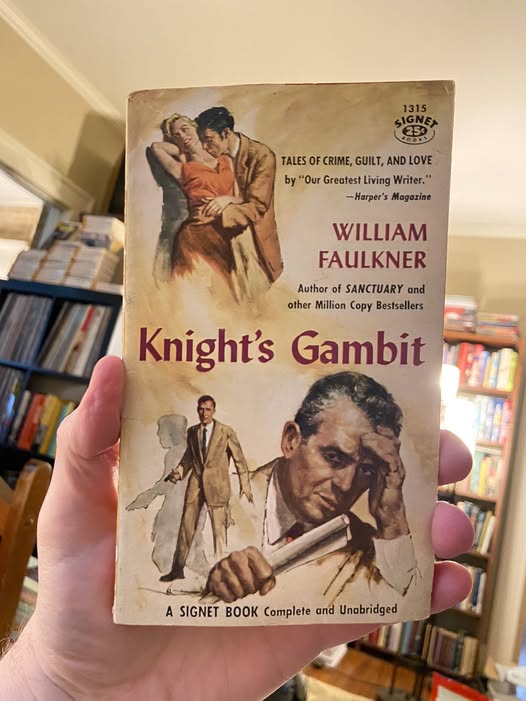Knight’s Gambit, published in 1949, is a collection of six detective stories by Nobel Prize-winning author William Faulkner, set in his fictional Yoknapatawpha County, Mississippi. The stories, written in the 1930s and 1940s, center on Gavin Stevens, a shrewd, compassionate county attorney who investigates crimes while navigating the complex human passions and social dynamics of the American South. Narrated by Stevens’ nephew, Chick Mallison, the tales blend mystery with Faulkner’s signature exploration of justice, morality, and the human condition. Unlike typical whodunits, these stories prioritize character motives and Southern folkways over straightforward crime-solving, with the restored edition by John N. Duvall presenting Faulkner’s original manuscripts, free from magazine editors’ cuts that diluted their regional flavor.
The Stories
1. Smoke (1932): Stevens investigates a family feud sparked by a disputed will, using a clever tactic to “smoke out” a judge’s killer, highlighting tensions over inheritance.
2. Monk (1937): A mentally disabled man’s inexplicable crime unravels through Stevens’ empathetic probe, revealing the tragedy of misunderstood lives.
3. Hand Upon the Waters (1939): Stevens uncovers the truth behind a murder tied to land disputes, showcasing his knack for decoding community secrets.
4. Tomorrow (1940): The standout story, not a murder mystery but a deep dive into a juror’s refusal to acquit, as Stevens pieces together a heartbreaking 20-year tale of loyalty and loss, described as “the lowly and invincible of the earth—to endure and endure.”
5. An Error in Chemistry (1941): Stevens solves a murder with a chemical twist, blending science and intuition in a quirky, engaging puzzle.
6. Knight’s Gambit (1949): The title novella, a chess-themed tale of murderous jealousy in a plantation family, sees Stevens preventing a crime while finding love, culminating in his marriage to the Widow Harriss.
Key Themes and Insights
Faulkner’s stories, while labeled mysteries, transcend the genre, focusing on human motivations and the moral ambiguities of justice. Stevens, a Harvard-educated yet down-to-earth lawyer, embodies compassion over rigid truth, as seen in his quote: “I am more interested in justice and human beings than truth”. The stories explore Southern life—its feuds, class divides, and resilience—while critiquing the gap between truth and justice, as Stevens notes: “I have seen truth that was anything under the sun but just, and I have seen justice using tools… I wouldn’t want to touch”. Though less dense than Faulkner’s masterpieces like The Sound and the Fury, the collection retains his lyrical style, with “Tomorrow” and “Hand Upon the Waters” often cited as highlights for their emotional depth and accessible prose./Classic Literature/


